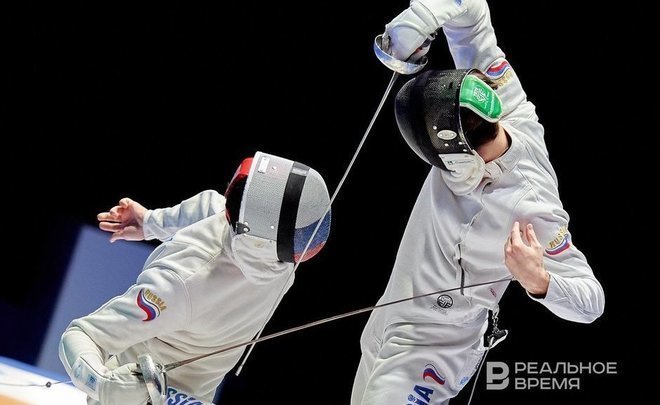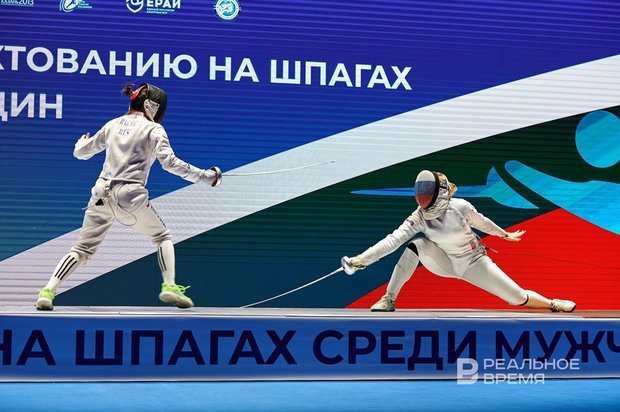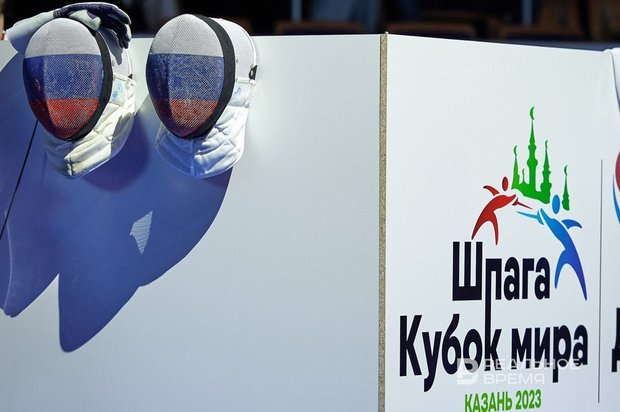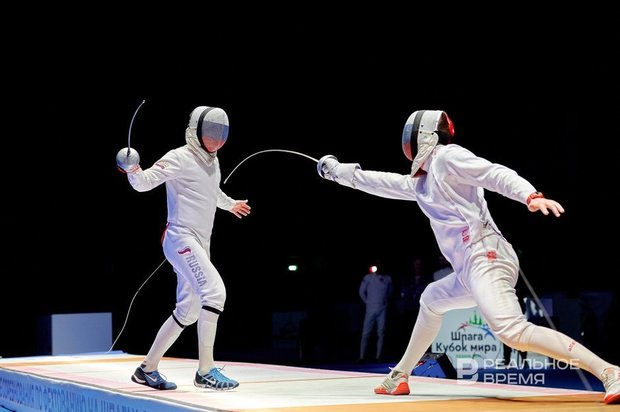Kazan hosts first Russian international tournament of the year

The first international competition of the pre-Olympic season ended in Kazan. The Gymnastics Centre hosted an epee tournament. Russians dominated in the men and women’s epee, which frankly speaking, isn’t surprising because of the list of competitors. Read more in Realnoe Vremya’s report.
No hospitality
Fencers’ competition at the Solidarity Cup ended with team events. Individually, Russians expectedly had total domination. In the women’s competition, two young fencers fought for victory — Ayzanat Mustafayeva, 21, and Anastasia Rustamova, who will be 18 in May. The strongest foreign athlete Yekaterina Pasharneva from Belarus fell out of the competition in the 1/8.
Vadim Anokhin who defeated Pavel Buzinov in the final became the winner. Foreigners didn’t reach 1/8 in the men’s competition, while the strongest foreigner Roman Alexandrov from Uzbekistan finished 25th, a bit higher than the host of the piste — Ramil Gaysin (29th position) — and a bit lower than Ozbek. It is a Bashkir fencer with an unusual last name for Russia Khamza Ozbek. However, Milen Bavuge Habimana, a daughter of a veterinarian from Rwanda who studied and got married in Moscow, was more exotic for Russians. This is our sports reply to Ukraine where Jean Belenyuk, a Ukrainian of Ugandan origin became the only Olympic champion in Tokyo. For a better understanding, Rwanda had a civil war between two dominating groups Hutu and Tutsi, and people from this country spread across different countries.

Down with details
The total domination of Russian fencers in the Kazan tournament wasn’t going to surprise anybody. There is even a series of a Soviet edition of Yeralash comic show when a big boy is surrounded by small ones and correctly answers all questions of the teacher. And when a girl pokes into the door and reminds him that year six was on the second floor, he replies: “Go to the second floor yourself. I will stay here. I am the smartest here.”
We will often remember some examples from cinema and music because the absurd that’s characteristic of today’s international sports movement can be explained by either cinematography or other sectors of show businesses living according to their own laws. Ending with the sports components, we will note that the tournament was not partly organised at the most convenient time. It is Ramadan time, this is why it was naive to hope, for instance, Azerbaijan, Egypt, Iran, Kuwait, Libya, Saudi Arabia, the Emirates, partly Nepal and Singapore. Somebody will disagree because same Singapore hosted the Asian Water Polo Championship at the beginning of Ramadan.
Firstly, only a part of the population is Muslim like in Nepal. Secondly, some of the competitions were held after sunset, plus, there is a possibility of substitutions in teams. Fencing combats were held at a time when neither food nor water could be consumed. And one can imagine how hard it was for Muslim athletes. Personally, I didn’t even have to imagine, I have repeatedly witness how hard it is for amateur footballers playing during the fast.
This can partly explain that we didn’t manage to “make friends” with everybody at the Kazan Solidarity Cup, though it is hard to explain the absence of Argentina, India, Colombia, Chile, and RAS. It is a list of our friendly countries that participated in last year’s world championship team events with different successes. In general Kazan welcomed only teams Iraq (44th place, the last), Kyrgyzstan (34th), Uzbekistan (24th) among the 2022 WC participants, after that, this strange list of competitors of the Kazan tournament ended. It is also hard to explain why, for instance, judges from Georgia and Kazakhstan participated in the competition but athletes from these countries didn’t.

The decision of the IOC
The decision of the IOC on principles according to which Russians can be allowed to compete at the next Olympics became the main topic of discussion at the fencing Solidarity Cup. Somebody abstractly writes about “true principles of the Olympic movement,” it would be enough to examine the history of the International Olympic Committee, the modern Olympic movement, decisions of IOC managers during different years to understand the motives of the current requirements for Russians.
The anti-Soviet message was, first of all, seen in long-standing actions and decisions even without diving into the psychological types of the IOC management of the past. Little has changed with time. It is enough to remember that in 2019 Thomas Bach hugged and awarded President of Belarus Alexander Lukashenko when the republic seriously invested in the organisation in the 2nd European Games and banned him from going to the Olympics in Tokyo in 2021: both the president of the country and president of the National Olympic Committee. “We should go to the court. Might Bach and Co. explain my guilt, because I protect my country?” This was Lukashenko’s “guilt” that he protected his country after being re-elected as president in 2019, six months after the European Games.
In one of its recent reports, in general Realnoe Vremya almost predicted the logic behind the decision to return fencers of Russia to international sport. Here is the quote: “The FIE would be ready to invite to all international competitions under the aegis of Konstantin Lokhanov. President of the Russian Olympic Committee Stanislav Pozdnyakov’s ex-son-in-law got divorced from his daughter Sofia and escaped to the USA disagreeing with Russia’s stance on foreign politics. While two-time Olympic champion of Tokyo Sofia Pozdnyakova, as it seems to me, should fear a veto more than all her colleagues.”

Time for crush course for athletes
During the Kazan competition, President of Russia’s Fencing Federation Ilgar Mamedov spoke out about the recommendation of the IOC on the potential competition of our athletes at the Olympics. Mamedov was surprised that “Why can athletes in big tennis play but in fencing, you don’t allow us to? Deal with it then.” Back to Mamedov’s indignation, let’s explain to him and our readers that Russians aren’t allowed to perform in tennis. Absolutely the same ban as everywhere is in force there. The International Tennis Federation imposed a veto on the performance of national teams of Russia in the men’s Davis Cup, women’s Federations Cup, in the mixed Hopman Cup and numerous junior European tournaments. Earlier, Kazan hosted different junior qualification tournaments at the Tennis Centre, now there are no competitions.
But professional tennis lives according to its own laws, and they are regulated by the ATP, the Association of Professional Tennis Players and WTA where Medvedev, Rublyov, the Kudermetovas sisters play. But if citizens of different countries, kingdoms, emirates compete in the same fencing, ladies and gents who represent themselves, not countries, compete in tennis. This is why it is permitted in tennis to create international pairs and mixed teams regardless of their citizenship. It impossible to imagine international teams in the world cup or a continental competition in any other sport. Except for figure skating, but skaters represent a country’s figure skating federation, not a country. The global difference is that world championships in all sports have quotas for countries and the same figure skating no more than three athletes from one country can compete in a big tournament. There is no such thing in tennis, the rating is key there. If all 128 athletes from the Grand Slam draw are citizens of one country, this how it will be. Since they represent only themselves, not a country. Therefore there aren’t any complaints about tennis players, neither are there about hockey players, same Alexander Ovechkin plays in the NHL as a Washington Capitals player, not Russian.
As for the inevitable continuation of sports isolation, we can remind you of Yugoslavia that was banned from 1992-1995, moreover, this happened during the country’s dissolution when only Serbia and small Montenegro stayed together. In the end, after its comeback, Yugoslavia won the European Men’s Basketball Championship, medals in handball and water polo and turned from a meddling team into one of the leaders of world volleyball both with the men and women’s teams. And all this happened amid a civil war, American sanctions and almost total isolation.
Reference
The author’s opinion does not necessarily coincide with the position of Realnoe Vremya’s editorial board.